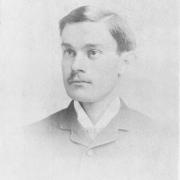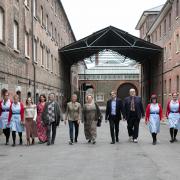Timothy Melbourne Wells tells us about life on Popes Villa Farm, Shipbourne
A day in the life of a Kent pig farmer
Timothy Melbourne Wells tells us about life on Popes Villa Farm, Shipbourne
What sort of farm is it?
Primarily pigs.
At what age did you start?
Immediately after leaving St Thomas’s School, now Sackville, in Sevenoaks. I was 17.
Who was your inspiration?
We are not a farming family – my father was a civil engineer and my mother a nurse – but quite a number of my school friends came from farming backgrounds. I think this is how my interest first began.
How long have you been in the farming industry?
27 years.
What training did you have?
I studied general agriculture at Hadlow College, where I had a fantastic time. I also learned a lot working on a sheep farm in Tonbridge and a dairy farm at Offham.
What sort of pigs do you have?
Oxford Sandy and Blacks. They are sometimes described as the ‘Plum Pudding pig’ – I guess because of their colouring. It is one of the oldest breeds and classified ‘rare.’ Their temperament is delightful and the sows are wonderful mothers. They are tough and hardy and very suited to the natural outdoor rearing system we practise for as much of the year as possible. The pork and bacon have superb flavour that is difficult to beat and the meat is particularly succulent. We have a wonderful boar, Ansty Alistair, I bought him in 2007 just before he won his class at the Royal Show.
We also produce Berkshire pigs. Apart from white socks, a blaze on the face and on the tip of the tail, they are completely black. Another rare breed, their many advocates include the Royal Family and Jamie Oliver. A lot of well-known chefs believe the pork produces the best crackling of all.
Describe your working day
Although we have a routine, every day is different. I usually feed at 8am. We mix our own feed – 40 per cent wheat, 40 per cent barley and 20 per cent peas or beans. Because our pigs are outdoor free range, they have opportunity to browse. We also feed apples – which they love – and other succulents. Although we don’t qualify for the official ‘organic’ label, our pigs are reared to near-organic standards. After feeding, I check the fencing. We rotate the areas we use and this means moving the pigs around regularly. There is always maintenance work and other odd jobs. My days are full.
Tell us something about the farm itself
I own about 10 acres, which were originally bought by my mother. I have the use of land belonging to my aunt and rent a further acreage nearby. At the current time the operation is very small, partly due to the fact that I was forced to cut back due to ill health – but also because I prefer to concentrate on very high quality rather than quantity. We keep the pigs out as long as possible. I make almost all the housing myself and also use some old stabling. We don’t use artificial insemination – which isn’t very successful with pigs anyway - but run the boar with selected sows. The gestation period is three months, three weeks and three days. Our sows are notably good mothers. We sell all our produce ex-farm: most of it ends up in pubs and restaurants that want quality and flavour. We also keep geese for their eggs and aim to produce guinea fowl and partridge.
Do you compete at agriculture shows?
No – but it is something I shall consider now my health is improving. I think shows are very important because they demonstrate the excellence of British farming. Our livestock production methods are second to none.
Do you have children following in your footsteps?
No – but I have a 10-year-old nephew living in Nottinghamshire. Neither of his parents is interested in farming, but when Joshua comes to stay, he loves getting involved and helping in every way. He says his ambition is to be a farmer!
Marks out of 10 for job satisfaction?
The easiest question of all! 10.
GET IN TOUCH
Popes Villa Farm, Hamptons Road, Shipbourne, nr Tonbridge TN11 9RQ
Tel: 01732 810649 or 07786 958679


























